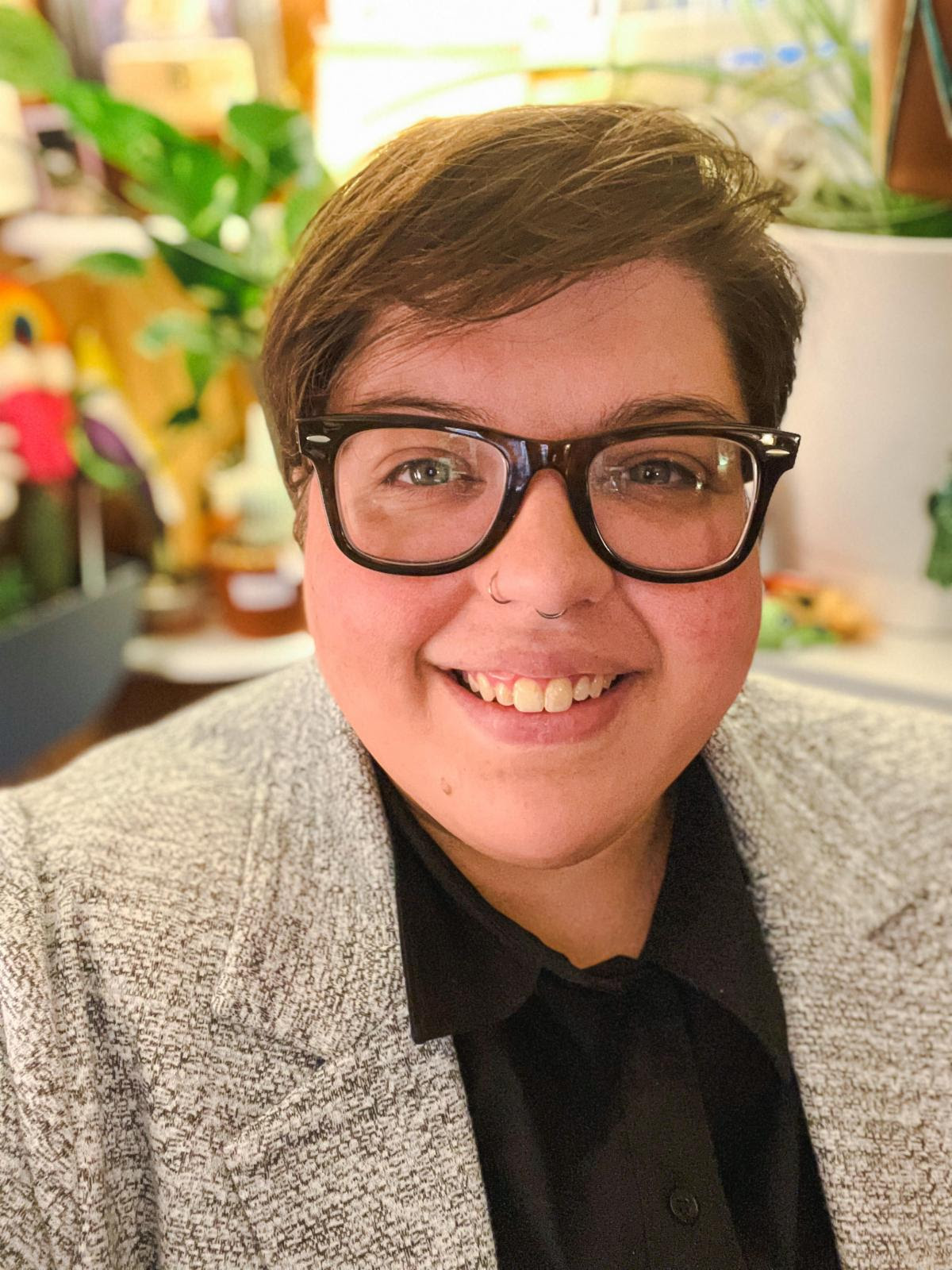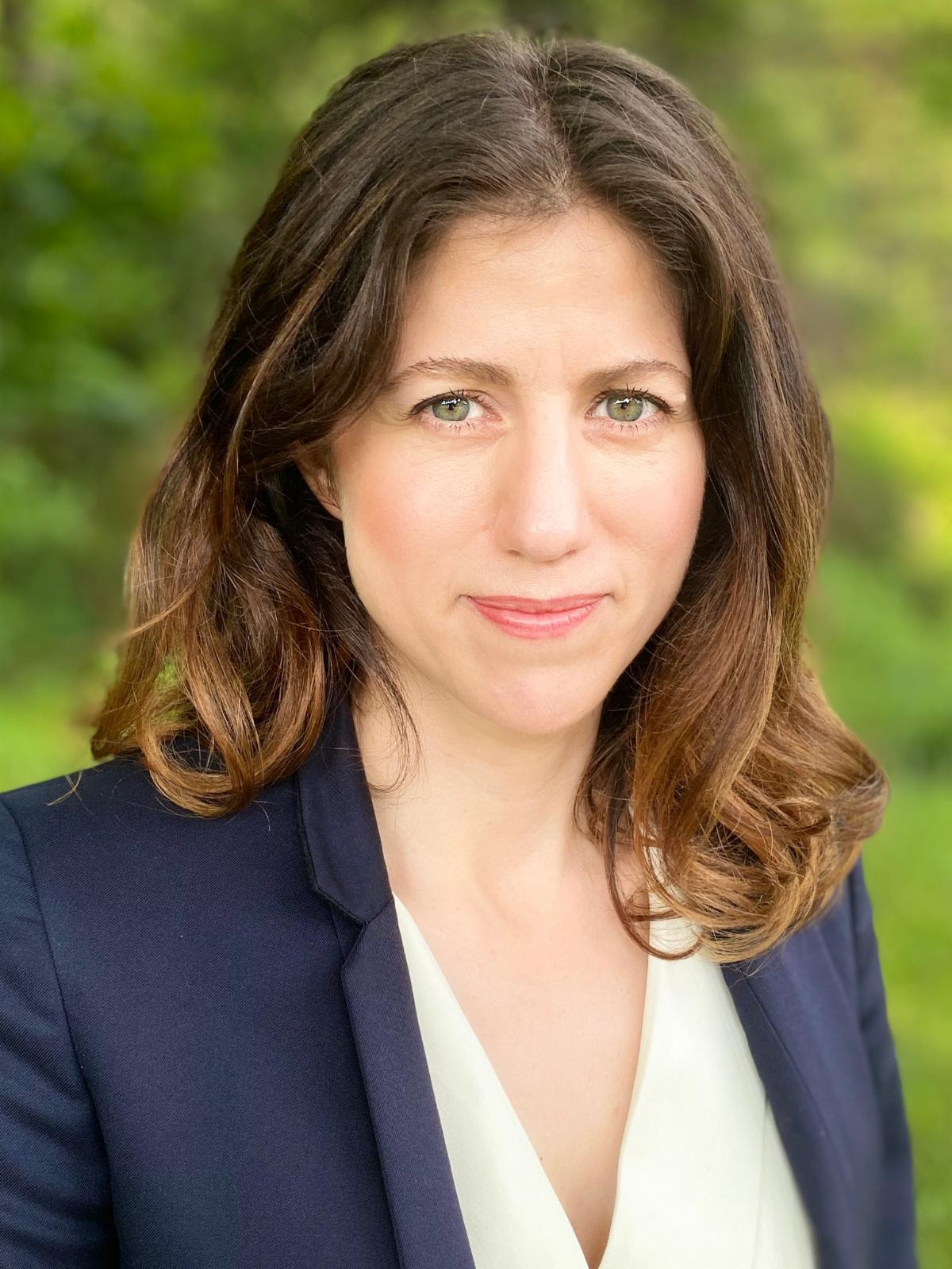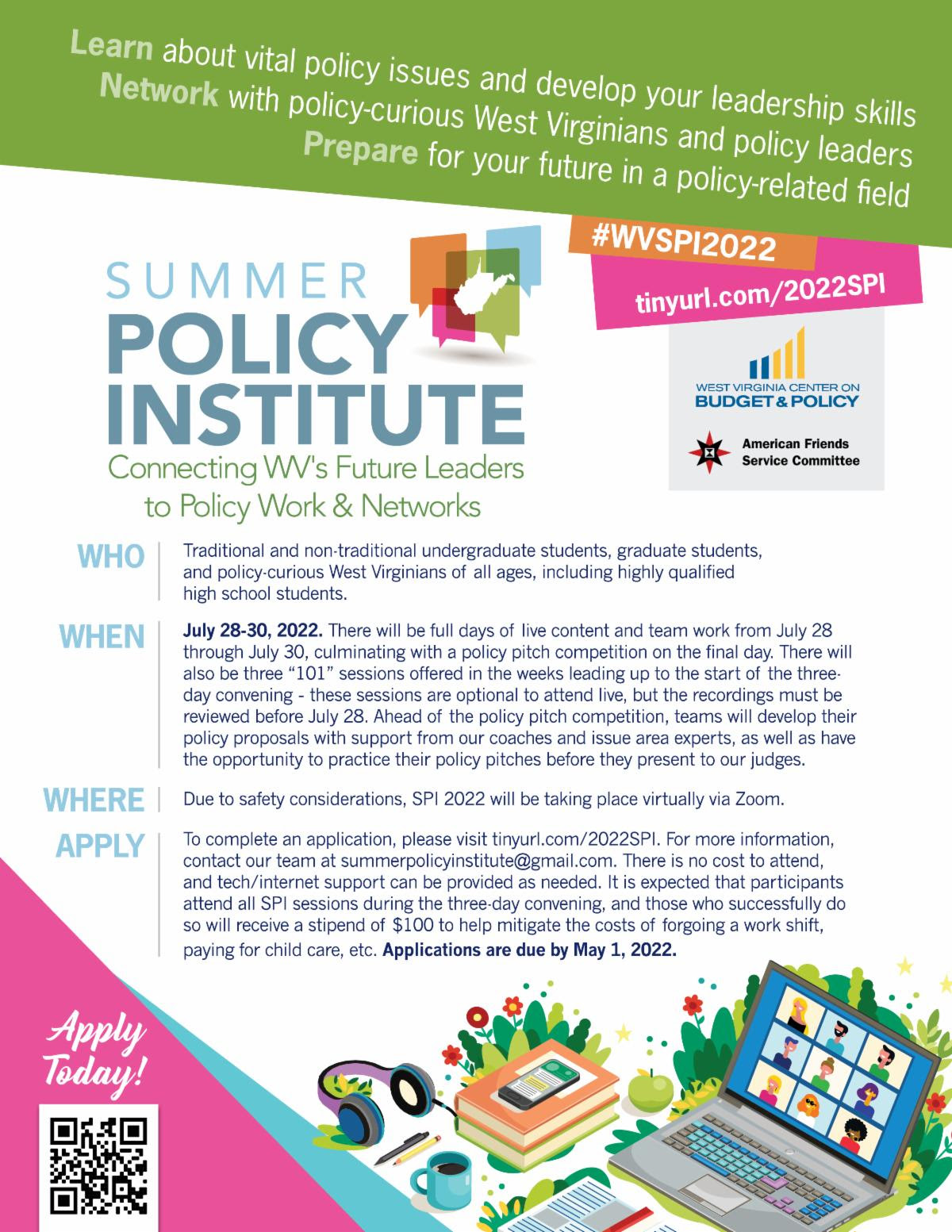The WVCBP is thrilled to share that we’ve added two new incredible members to our team!
Ash Orr (they/them, he/his) is now serving as the Center’s policy outreach coordinator. Before joining the WVCBP, Ash worked as a political organizer for RepresentUs and he currently serves as the Chair of the Morgantown Human Rights Commission. As a lifelong Appalachian, he is passionate about creating systemic change through activism, education, the creation of new ordinances and policies, and mutual aid. In their spare time, they are a La Croix connoisseur and enjoy gardening, traveling, adding to their rock collection, and playing board games with their spouse.
Sara Whitaker (she/her) is now serving as the Center’s criminal legal policy analyst. Prior to joining the WVCBP, Sara spent nine years in the Kanawha County Public Defender’s Office, where she had the privilege to represent, and learn from, hundreds of West Virginians accused in state court. A native of Los Angeles, Sara has a bachelor’s and law degree from Northwestern University. Since 2018, she has served on the faculty of Gideon’s Promise, a national public defender training organization.
We asked Ash and Sara a few questions each to give them the opportunity to share about themselves. Check out their answers below.
What are you most proud of regarding your work prior to joining the WVCBP?
Ash: I’ve been the Chair of the Morgantown Human Rights Commission since mid-2021 and the work our commission has accomplished is truly incredible. We have passed numerous policies and ordinances including the Banning of Conversion Therapy, as well as becoming the first municipality in West Virginia to pass The Crown Act.
Sara: As a public defender, I was confronted by the immense trauma experienced by the people I represented. Over the years, I started to incorporate research about adverse childhood experienced (ACEs) into my memos, client interviews, and courtroom arguments. It started to make a difference, and eventually I got the chance to train hundreds of public defenders and social workers across the country to do the same in their practice.
What aspect of your work at the WVCBP are you most excited about?
Ash: Constituency outreach and advocacy! There is nothing more professionally rewarding to me than working alongside constituents. Sitting down and working with them one-on-one on what matters most to them, helping them to become their own advocate, and watching their confidence blossom is one of the best feelings to me.
Sara: The people who are most hurt by the criminal legal system are also the people who have the least say over how to change it. In this job, I’m excited to work alongside them and their families – to conduct vital research that helps us win fundamental policy change at the state and local level.
What are three fun facts you would like to share with our supporters?
Ash:
Sara:
The WVCBP is excited and grateful to welcome these two wonderful folks to our staff. They both display profound care for our state’s most marginalized communities, as well as a deep commitment to building a kinder, more equitable West Virginia. We look forward to what’s ahead for our newly expanded team. Welcome again, Ash and Sara!


When it comes to tax policy during the 2022 West Virginia legislative session, what is most notable is arguably what didn’t become law rather than what did, as once again a bill seeking to eliminate the state’s personal income tax failed to pass. However, a number of other tax bills did make it through the legislative process. The impacts of the bills vary, with some having small, immediate impacts, and others having potentially large, future impacts. And while the Legislature and governor passed and signed their second consecutive year of a “flat budget” with no new investments for workers and families, lawmakers had no issue passing new tax incentives and credits for businesses that have the same impact on the state budget as new spending, making future investments all the more difficult to commit to.
This week’s blog post includes a recap of those bills. The bills examined include:
Read Sean’s full blog post.

With three-quarters of the fiscal year completed, West Virginia state revenue collections are far surpassing estimates. However, it must be noted that this surplus should not be taken as an indicator of fiscal strength, as it only exists due to the combination of artificially low revenue estimates set by the governor and an influx of federal funding due to the ongoing pandemic. A recent article, including insight from WVCBP senior policy analyst Sean O’Leary, includes more details. Excerpt below:
Under Tomblin’s administration, state officials had to make substantial cuts when the actual revenue the state collected was less than Tomblin’s estimates amid significant downturns in the coal markets in particular.
The opposite has been true under Justice’s administration, which underestimates revenue collection, leading to higher-than-estimated collection, which includes an uptick in the natural gas market, Deputy Revenue Secretary Mark Muchow told lawmakers in November.
Justice’s revenue estimates are the numbers on which the West Virginia Legislature bases its deliberations on the state’s budget each year.
In a series of tweets earlier this week, Sean O’Leary, policy analyst for the West Virginia Center on Budget & Policy, said the governor’s low revenue estimates might lead to big surpluses but they limit the amount of money state agencies and government-supported programs can ask for, because of the appearance of there not being enough money to support those programs.
“Schools and libraries and health programs can’t include those surplus funds in their budget requests,” O’Leary wrote on Twitter about the fiscal year 2023 budget. “So most of the surplus funds are earmarked for the governor and corporate handouts.”
While Justice has touted setting a “flat” budget in recent years, this year’s and next year’s budgets rely heavily on almost $10 billion in federal funds, largely from coronavirus relief packages, O’Leary said.
“That additional federal aid won’t last forever, which is why using low revenue estimates and flat budgets to manufacture surpluses to use for tax cuts and corporate handouts is less than ideal,” O’Leary said.
You can read the full article here.

The Summer Policy Institute (SPI) is an annual convening hosted by the WVCBP and the American Friends Service Committee that brings together highly qualified traditional and non-traditional undergraduate students, graduate students, and policy-curious people of all ages to build policy knowledge, leadership skills, and networks.
Attendees participate in interactive sessions where they learn the basics of data, policy, and state government and build their organizing and advocacy skills. Throughout the institute, participants work in small groups to identify and develop policy proposals to shape the future they want to see in West Virginia, culminating in team “policy pitches” to state legislators and policy professionals. Many SPI attendees have gone on to continue advocating for their policy idea and to hold internships with West Virginia non-profits and in state government.
This year’s SPI theme is “Growing a West Virginia that Works for Everyone.”
Due to ongoing public health considerations, SPI 2022 will take place virtually via Zoom from July 28-30. Find further details and instructions to apply in the flyer below and on our event landing page here. There is no cost to attend. Please don’t hesitate to reach out to our team at summerpolicyinstitute@gmail.com with any questions.
We will be accepting applications through May 1. People of all ages are welcome to apply, so please feel free to share with any folks you think may be interested!

Since July 2021, most households with children had received monthly enhanced Child Tax Credit payments of $250- 300 per child. However, the enhanced Child Tax Credit was temporary and expired at the end of 2021 unless Congress acts to extend it in 2022 through the Build Back Better Act or other legislation.
The impact on children and families since the expiration of the enhanced Child Tax Credit has been severe. Between Dec. 2021 and Jan. 2022, there was a staggering 41 percent increase in child poverty nationwide due to the loss of the monthly payments. And as inflation continues to exacerbate family financial hardship, the need to make the enhanced Child Tax Credit permanent is as urgent as ever.
If you received monthly Child Tax Credit payments, we’d love to hear how they had been helping your family and how your family has been impacted now that the payments have (at least temporarily) expired.
Join us in our advocacy by completing our survey here or participating in the #Unbearable Child Tax Credit campaign.
Learn more about what’s at stake if the enhanced Child Tax Credit is not extended in our blog post here.
Find guidance on how to collect your Child Tax Credit payment here.

The WVCBP’s Elevating the Medicaid Enrollment Experience (EMEE) Voices Project seeks to collect stories from West Virginians who have struggled to access Medicaid across the state. Being conducted in partnership with West Virginians for Affordable Health Care, EMEE Voices will gather insight to inform which Medicaid barriers are most pertinent to West Virginians, specifically people of color.
Do you have a Medicaid experience to share? We’d appreciate your insight. Just fill out the contact form on this webpage and we’ll reach out to you soon. We look forward to learning from you!
You can watch WVCBP’s health policy analyst Rhonda Rogombé and West Virginians for Affordable Health Care’s Mariah Plante further break down the project and its goals in this FB Live.
